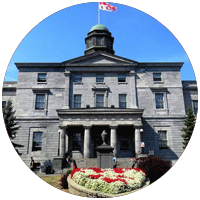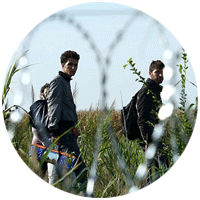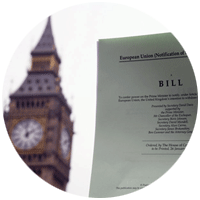Angela Campbell comments on the value of campus sexual violence policies, Allison Christians blogs about the Panama Papers; Richard Gold pens an op-ed on the NAFTA patent case involving Eli Lilly; Alana Klein talks on the legalization of marijuana in Canada; François Crépeau wants a new agenda for facilitating human mobility; Frédéric Mégret writes about the other ‘Other’ in international law; Johanne Poirier casts a critical eye on 150 years of Canadian federalism; Armand de Mestral pens two pieces about Brexit; Richard Gold reminds us that social context is key component of innovation; and finally law librarian Svetlana Kochkina unearths a hidden private library inside the Wainwright Rare Books Collection.
The value of campus sexual violence policies
Angela Campbell, University Affairs, 17 April 2017
 If developed and implemented with meaningful consultation, such policies can have both a symbolic and instrumental impact.
If developed and implemented with meaningful consultation, such policies can have both a symbolic and instrumental impact.
Recently, McGill University adopted its policy against sexual violence [pdf]. While celebrating this development, I admit that well before this policy was drafted and adopted, I was skeptical about its utility. As a law professor who assesses rules and authority from a feminist critical perspective, I was doubtful about the potential of an institutional policy to address campus sexual violence. To my mind, a policy seemed like a naive and simplistic way of responding to the broad and complex challenge of sexual violence, which is rooted in forces that lie well beyond any single university’s control.
In my current administrative role at McGill, I have the privilege of collaborating with diverse members of our university community, many of whom have felt for some time that every university must have its own formal policy on sexual violence. Through conversation and collaboration with these community members, it became plain that McGill, like all Canadian postsecondary institutions, would benefit from a policy against sexual violence. Keep reading…
Evasion, Avoidance, and Bashing Panama in a World of Aggressive Tax States
Allison Christians, Tax, Society & Culture, 9 April 2017
 “I’ve talked to a few journalists and commented a bit on the Panama Papers, but I’ve refrained from writing much to date because I am uneasy about a couple of central themes in this story: first, the constant confluence of tax evasion and tax avoidance, which are two completely different phenomena that require two very different responses, and second, the bashing of Panama as if only bad things can be done there, so anyone who does anything there from anywhere else must be doing a bad thing.
“I’ve talked to a few journalists and commented a bit on the Panama Papers, but I’ve refrained from writing much to date because I am uneasy about a couple of central themes in this story: first, the constant confluence of tax evasion and tax avoidance, which are two completely different phenomena that require two very different responses, and second, the bashing of Panama as if only bad things can be done there, so anyone who does anything there from anywhere else must be doing a bad thing.
I am uneasy about this bashing because, although I think there are bad guys doing bad things in Panama, I also think there are bad guys doing bad things all over the world and I don’t like Panama being singled out…” Keep reading…
NAFTA Patent Ruling a Big Victory for Canadian Innovation
Richard Gold, The Globe and Mail, 6 April 2017
 Last month, multinational drug firm Eli Lilly lost a big gambit to force Canada to comply with its wishes, rather than what is in the best interests of Canada. It lost big: Not only did its own appointed member of the NAFTA tribunal vote against Eli Lilly, but the tribunal required it to pay some of Canada’s costs.
Last month, multinational drug firm Eli Lilly lost a big gambit to force Canada to comply with its wishes, rather than what is in the best interests of Canada. It lost big: Not only did its own appointed member of the NAFTA tribunal vote against Eli Lilly, but the tribunal required it to pay some of Canada’s costs.
But the win is only the beginning: The decision strengthens our ability to develop a made-in-Canada innovation policy that places priority on Canadian firms, patients and consumers. The case Eli Lilly lost revolved around an arcane part of patent law. Essentially, Eli Lilly wanted a patent even if its product did nothing useful: merely taking up space would have been enough. It sued Canada under the North American free-trade agreement for $500-million. Keep reading…
Professor Alana Klein on the Legalization of Marijuana in Canada
Juliana Fanous & Hannah Reardon, HappenStance IHSP policy brief, April 2017
 In light of the rapidly shifting landscape regarding the legalization of marijuana in Canada, an interview with Professor Alana Klein sheds light on the heated topic.
In light of the rapidly shifting landscape regarding the legalization of marijuana in Canada, an interview with Professor Alana Klein sheds light on the heated topic.
HappenStance, McGill’s Institute for Health and Social Policy magazine, takes a deeper look at the issue of marijuana prohibition in Canada, the legal implications of regulation models, and the cost benefit analysis of this shift in policy.
“One important thing that the Task Force Final Report suggests and that I would really want to emphasize is to ensure research and consultation involving community actors, public health actors, people who use drugs, and experts, both before and after the legislation comes into effect.” Keep reading… [.pdf]
A New Agenda for Facilitating Human Mobility after the UN Summits on Refugees and Migrants
François Crépeau, openDemocracy, 24 March 2017
 Mobility is key to development and prosperity, and with the proper vision we can make broader legal pathways for migration work for everyone.
Mobility is key to development and prosperity, and with the proper vision we can make broader legal pathways for migration work for everyone.
“The failure of deterrence and prohibition policies: Many factors weigh into a potential migrant’s decision-making process regarding when, where, and why they want to migrate. Some of these factors are often described as ‘push and pull’ factors, the overly broad but classic examples for which are poverty or war on the one side, and opportunity and peace on the other. Yet discussion about these factors is on the whole extremely shallow, and is often no more than scaremongering about ‘benefit scroungers’ and migrants ‘taking our jobs’… Now, if you put a barrier between the reasons individuals want or need to move and the reasons why people within a destination country would like to have them come, yet leave everything else untouched, you create perfect conditions for underground labour markets and smuggling markets to flourish.” Keep reading…
The Other ‘Other’: Moors, International Law and the Origin of the Colonial Matrix
Frédéric Mégret and Pierre-Alexandre Cardinal, SSRN, 21 March 2017
 Professor Frédéric Mégret and recent grad Pierre-Alexandre Cardinal (LLM’17) contributed an article to the forthcoming book New Approaches to the History of International Law and Islam edited by I. de la Rasilla del Moral & A. Shahid (Leiden: Martinus Nijhoff/Brill, 2017).
Professor Frédéric Mégret and recent grad Pierre-Alexandre Cardinal (LLM’17) contributed an article to the forthcoming book New Approaches to the History of International Law and Islam edited by I. de la Rasilla del Moral & A. Shahid (Leiden: Martinus Nijhoff/Brill, 2017).
“… In particular the beginning of international law is located in the writings of the Spanish post-scholastics of the Salamanca school, essentially Dominicans and Jesuits reflecting on Aquinas’ rendition of natural law. The “Other” of International Law, therefore, is conceived as being the Indian of the Americas, one whose encounter powerfully contributed to the shaping of an international system becoming aware of his radical difference. Still, international law’s debt to its encounter with its Muslim Other, despite its evident linkages to early modernity, remains curiously absent from the discipline’s historiography.” Keep reading…
150e anniversaire du Canada : Le moment de faire le point
Johanne Poirier, Le Devoir, 20 mars 2017
 « L’année 2017 marque les 150 ans de la fédération canadienne. L’anniversaire ne mérite pas nécessairement une célébration. Mais c’est le moment de faire le point et de lever les tabous. Imaginez des jeunes qui se disent que la coexistence pacifique et les différents modes de réconciliation doivent, aussi, passer par une discussion sur nos valeurs partagées et sur les modalités d’organisation et de partage du pouvoir. Imaginez que le mot « Constitution » ne soit plus un « vilain mot »… ou un somnifère…
« L’année 2017 marque les 150 ans de la fédération canadienne. L’anniversaire ne mérite pas nécessairement une célébration. Mais c’est le moment de faire le point et de lever les tabous. Imaginez des jeunes qui se disent que la coexistence pacifique et les différents modes de réconciliation doivent, aussi, passer par une discussion sur nos valeurs partagées et sur les modalités d’organisation et de partage du pouvoir. Imaginez que le mot « Constitution » ne soit plus un « vilain mot »… ou un somnifère…
Pendant vingt-cinq ans (grosso modo de 1970 à 1995), les Canadiens ont « parlé Constitution » : ils ont négocié, voté dans des référendums, témoigné devant des commissions et écrit des centaines d’études universitaires sur la crise existentielle au Canada. Or, depuis, les débats se sont estompés, voire ont été bannis de l’espace public. » Lire la suite…
Why Women Over 40 Are Having More Babies… And Other Secrets from the Hidden Social History of Innovation
Richard Gold (with Matt Malone, 2L), CIGI online, 16 March 2017
 “When asked to name the greatest innovations in human history, people invariably think of technology. Polls often reveal the Gutenberg printing press, a technological contraption, as the greatest in history (Sci/Tech 1999). Recently published “biographies” of other discoveries and inventions point to the importance of plastic (Freinkel 2011), anesthesia (Fenster 2001) and even salt (Kurlansky 2002).
“When asked to name the greatest innovations in human history, people invariably think of technology. Polls often reveal the Gutenberg printing press, a technological contraption, as the greatest in history (Sci/Tech 1999). Recently published “biographies” of other discoveries and inventions point to the importance of plastic (Freinkel 2011), anesthesia (Fenster 2001) and even salt (Kurlansky 2002).
These answers indicate that we too often think about innovation the wrong way. Behind these things, we have forgotten an essential component: the social context. For a technology to solve a given problem, accelerate a sluggish process or elevate our standard of living, it must respond to a social need…” Keep reading…
What Does Brexit Mean for Canada? A Lot, Unfortunately
Armand de Mestral, CIGI online, 29 March 2017
 What Ottawa must do next now that Brussels has bid a fateful farewell to London
What Ottawa must do next now that Brussels has bid a fateful farewell to London
The Ides of March have come and gone. With a hand-delivered letter to Brussels, Prime Minister Theresa May has served notice under article 50 of the Treaty on European Union (TEU) of Britain’s intention to withdraw. “Thank you and goodbye” was the simple reply of Donald Tusk, the president of the European Council who received the historic missive and will now convene a summit of EU leaders on April 29 to adopt guidelines for Brexit negotiations that are expected to last up to two years.
The Dutch elections with their ugly increase in support for an anti-immigrant party were held on the Ides of March. France will vote on April 24 and May 7. The Germans will vote on September 24. To make another Shakespearean analogy: “The sword is drawn and all is on the hazard.” […]
What does this all mean for Canada? Unfortunately, a great deal. Keep reading…
Reality sets in over Brexit
Armand de Mestral, OpenCanada.org, 15 March 2017
 The implementation of Brexit is not simply a UK-EU problem — countries like Canada should also be concerned
The implementation of Brexit is not simply a UK-EU problem — countries like Canada should also be concerned
“The reality of the challenges before the United Kingdom concerning Brexit appears to be gradually sinking in. Legislation authorizing the Brexit notice under article 50 of the Treaty on European Union (TEU) has passed Parliament. A sobering government White Paper on Brexit is also in circulation. […]
However, the debate around implementation of Brexit is not simply a UK-EU problem. Countries like Canada should be concerned.” Keep reading…
Listening to the Dead With Our Eyes: François Olivier-Martin’s Library, a Mirror Image of a Legal Historian
Svetlana Kochkina, Library and Information History, August 2016
 François Olivier-Martin’s research library – one of the most comprehensive private libraries on the history of Ancien Régime French law at the time, amassed by a respected and controversial scholar – ceased to exist as a separate collection when it was blended into the Wainwright Collection in the late 1950s.
François Olivier-Martin’s research library – one of the most comprehensive private libraries on the history of Ancien Régime French law at the time, amassed by a respected and controversial scholar – ceased to exist as a separate collection when it was blended into the Wainwright Collection in the late 1950s.
Nahum Gelber Law Library liaison librarian Svetlana Kochkina details in this fascinating article how the Olivier-Martin library had become a ‘hidden collection’, along with the work that went into tracing, identifying and examining the 775 or so books it had originally contained. This work which yielded insights into the life, personality and history of French legal historian François Olivier-Martin (1879–1952).
As she writes, “private libraries that belonged to the scholars of the past can act as time capsules of history, general, intellectual, or disciplinary, and help modern researchers immerse themselves in the days gone by with all.”Keep reading…
